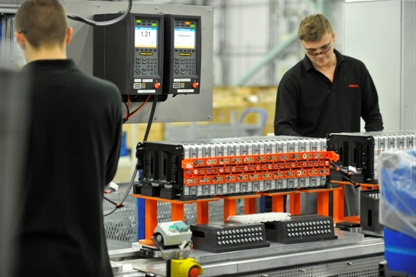The UK’s first battery development facility has been confirmed by business secretary Greg Clark, who has announced that £80 million of funding will be ploughed into the Midlands project.
In the first tranche of cash to be released from the £246 million Faraday Battery Challenge, the funding was won by a bid from a consortium led by Coventry and Warwickshire Local Enterprise Partnership.
As part of the Automotive Sector Deal included in the recent Industrial Strategy, the battery facility is part of efforts to place the UK at the forefront of the global energy storage market. It will be responsible for turning the most promising early and mid-stage research and development practices into scalable and commercially viable propositions.
According to the Department of Business, Energy and Industrial Strategy (BEIS) it will host cutting edge production and assembly processes to do this and support the scale up of battery technologies.
While independent from government, the facility will only be openly accessible to UK companies in an effort to build the nation’s independent supply chain for battery storage.
Greg Clark said: “Battery technology is one of the most game-changing forms of energy innovation and it is one of the cornerstones of our ambition, through the Industrial Strategy and the Faraday Challenge, to ensure that the UK leads the world, and reaps the economic benefits, in the global transition to a low carbon economy.
“The new facility, based in Coventry and Warwickshire, will propel the UK forward in this thriving area, bringing together the best minds from academia and industry together to deliver innovation and R&D that will further enhance the West Midlands international reputation as a cluster of automotive excellence.”
Another £40 million to tackle the biggest challenges
During a speech to the Battery and Energy Storage Conference, Clark also announced that 22 projects have won a share of £40 million of additional Faraday funding to tackle some of the biggest challenges preventing the uptake of electric vehicles in the UK.
The cash has been allocated through Innovate UK to projects covering key technologies such as the development of battery materials and cell manufacturing; design and production of modules and packs including advances in thermal management and battery management systems; and recycling and recyclability of battery packs.
For example, a consortium led by clean-tech start-up Brill Power will explore how battery management control systems can be used to enhance the battery manufacture and performance of electric vehicles.
Another project will look at taking end-of-life, automotive lithium-ion batteries and either reusing, remanufacturing or recycling them. It will build a complete supply chain network with legal and regulatory knowledge in the UK to optimise battery design and increase use in second-life applications.
Others include building the UK into a hub for battery cell manufacture; developing battery modules and packs for a range of vehicles, including supercars, buses and diggers; and developing a new battery storage system for heavy-duty vehicles.
Ruth McKernan, chief executive of Innovate UK, said: “The Faraday Battery Challenge is breaking new ground because it offers for the first time a co-ordinated programme of competitions across research, innovation and scale-up.
“It will therefore draw the very best of the UK’s world-leading research into commercial technologies and put UK businesses at the forefront of electric vehicle battery development.”
The post-Brexit opportunity of electric vehicles
Electric vehicles have been identified as a key post-Brexit manufacturing opportunity for the UK, with climate change minister Claire Perry this week repeating that one in five of the EVs driven in Europe are produced in the UK.
A number of manufacturers have sizeable facilities in the UK, such as Nissan in Sunderland, and in the Midlands region specifically, such as Jaguar Land Rover, which was supportive of the ambition unveiled this week.
Dr Ralf Speth, chief executive of Jaguar Land Rover, said: “If the UK wants to stay competitive and make domestic EV manufacturing viable in the long run, a high level of ambition is required as set out in the Industrial Strategy.
“JLR is already investing heavily to make the vision of autonomous and electric mobility come true. From 2020, all of our new vehicles will be electrified with mild hybrid, plug-in hybrid and battery electric solutions, and these are already being designed in the West Midlands.
“We also intend to produce battery electric vehicles in the region, bringing the West Midlands to the forefront of modern mobility in the UK.”





